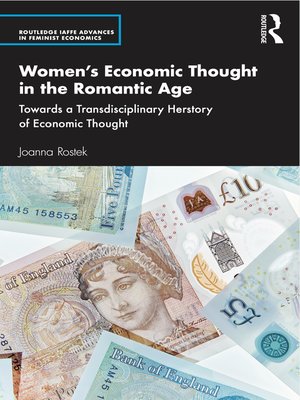Women's Economic Thought in the Romantic Age
ebook ∣ Towards a Transdisciplinary Herstory of Economic Thought · Routledge IAFFE Advances in Feminist Economics
By Joanna Rostek

Sign up to save your library
With an OverDrive account, you can save your favorite libraries for at-a-glance information about availability. Find out more about OverDrive accounts.
Find this title in Libby, the library reading app by OverDrive.



Search for a digital library with this title
Title found at these libraries:
| Library Name | Distance |
|---|---|
| Loading... |
This book examines the writings of seven English women economists from the period 1735-1811. It reveals that contrary to what standard accounts of the history of economic thought suggest, eighteenth- and early nineteenth-century women intellectuals were undertaking incisive and gender-sensitive analyses of the economy.
Women's Economic Thought in the Romantic Age argues that established notions of what constitutes economic enquiry, topics, and genres of writing have for centuries marginalised the perspectives and experiences of women and obscured the knowledge they recorded in novels, memoirs, or pamphlets. This has led to an underrepresentation of women in the canon of economic theory. Using insights from literary studies, cultural studies, gender studies, and feminist economics, the book develops a transdisciplinary methodology that redresses this imbalance and problematises the distinction between literary and economic texts. In its in-depth readings of selected writings by Sarah Chapone, Mary Wollstonecraft, Mary Hays, Mary Robinson, Priscilla Wakefield, Mary Ann Radcliffe, and Jane Austen, this book uncovers the originality and topicality of their insights on the economics of marriage, women and paid work, and moral economics.
Combining historical analysis with conceptual revision, Women's Economic Thought in the Romantic Age retrieves women's overlooked intellectual contributions and radically breaks down the barriers between literature and economics. It will be of interest to researchers and students from across the humanities and social sciences, in particular history of economic thought, English literary and cultural studies, gender studies, economics, eighteenth-century and Romantic studies, social history, and history of ideas.







